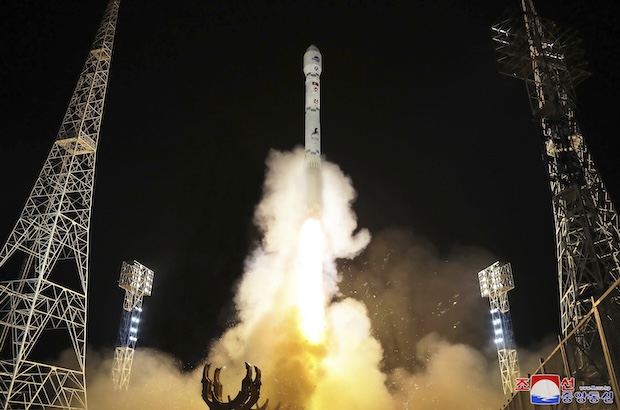US, S. Korea, Japan urge stronger global push vs N. Korea’s nuke program

SEOUL, South Korea — The national security advisers of the United States, South Korea, and Japan on Saturday called for a stronger international push to suppress North Korea’s development of nuclear weapons and missiles, its cybertheft activities, and alleged arms transfers to Russia.
The meeting in Seoul came as tensions on the Korean Peninsula are at their highest in years, with North Korean leader Kim Jong Un accelerating the expansion of his nuclear and missile program and flaunting an escalatory nuclear doctrine that authorizes the preemptive use of nuclear weapons.
The United States and its Asian allies have responded by increasing the visibility of their trilateral partnership in the region and strengthening their combined military exercises, which Kim condemns as invasion rehearsals.
Washington, Seoul, and Tokyo have also expressed concerns about a potential arms alignment between North Korea and Russia. They worry Kim is providing badly needed munitions to help Russian President Vladimir Putin wage war in Ukraine in exchange for Russian technology assistance to upgrade his nuclear-armed military.
Speaking after the meeting, US national security adviser Jake Sullivan said Washington is working with Seoul and Tokyo to strengthen defense cooperation and improve its response to North Korean missile testing and space-launch activities, including a real-time information-sharing arrangement on North Korean missile launches that the countries plan to start at an unspecified date in December.
He also said the countries have agreed to new initiatives to more effectively respond to North Korean efforts to bypass US-led international sanctions that aim to choke off funds for its nuclear weapons and missile program.
Article continues after this advertisement“This will be a new effort with respect to cryptocurrency and money laundering and how we disrupt North Korea’s capacity to gain revenue from the hacking and stealing of cryptocurrency and then laundering it through exchanges,” he said.
Article continues after this advertisementSullivan declined to share detailed US assessments on the types and volume of North Korean arms being shipped to Russia and didn’t comment on the specifics of his discussions with South Korean and Japanese officials over the issue, but insisted that “there’s no daylight among us in terms of the types of weapons transfers that we are seeing. And those continue and they represent a grave concern for us.”
South Korean intelligence and military officials have said North Korea may have shipped more than a million artillery shells to Russia beginning in August, weeks before Kim traveled to Russia’s Far East for a rare summit with Putin that sparked international concerns about a potential arms deal. Both Moscow and Pyongyang have denied US and South Korean claims.
In a joint news conference after Saturday’s trilateral meeting, Cho Tae-yong, South Korea’s national security office director, said the three security advisers reaffirmed North Korea’s obligations under multiple UN Security Council resolutions that call for its denuclearization and ban any weapons trade with other countries and agreed to strengthen coordination to ensure that is implemented.
Takeo Akiba, Japan’s national security secretariat secretary general, said the “unprecedented frequency and patterns” of North Korean ballistic missile launches necessitate a deeper and more effective partnership between Washington, Seoul, and Tokyo.
South Korea, the US, Japan, and Australia have also announced their own sanctions on North Korea over its spy satellite launch last month. North Korea argues it the right to launch spy satellites to monitor US and South Korean military activities and enhance the threat of its nuclear-capable missiles.
During his conversation with reporters, Sullivan said the allies are preparing for the possibility that North Korea will up the ante of its weapons demonstrations and threats in 2024, possibly including the country’s seventh nuclear test.
Direct military action is also a concern after the North recently announced it was abandoning a 2018 inter-Korean military agreement on reducing border tensions after the South partially suspended the agreement, which had established border buffers and no-fly zones. Some experts say that has raised the risk of border-area shootings or clashes.
“Look, when a country announces its intent to walk away from a set of measures that are designed to help reduce risk and increase stability, our concern for potential incidents, provocations has to go up,” Sullivan said, though he said the full implications of the North’s announcement is not immediately clear.
Sullivan held separate bilateral talks Friday with Cho and Akiba and also met with South Korean President Yoon Suk Yeol.
The US, South Korean, and Japanese national security advisers last held a trilateral meeting in June in Tokyo.
South Korean intelligence officials have said the Russians likely provided technology support for North Korea’s successful satellite launch in November, which followed two failed launches.
North Korea has said its spy satellite transmitted imagery with space views of key sites in the U.S. and South Korea, including the White House and the Pentagon. But it hasn’t released any of those satellite photos. Many outside experts question whether the North’s satellite is sophisticated enough to send militarily useful high-resolution imagery.
Kim has vowed to launch more satellites, saying his military needs to acquire space-based reconnaissance capabilities.
South Korean officials have also said North Korea-made rocket-propelled grenades and other weapons could have been used by Hamas during its Oct. 7 assault on Israel and that the North could be considering selling weapons to militant groups in the Middle East.
Sullivan said that the United States has not seen any specific evidence of that but remains vigilant about the possibility.
“I think given North Korea’s history of proliferation activities, including to reprehensible actors in other contexts across history, it’s a legitimate concern,” he said.